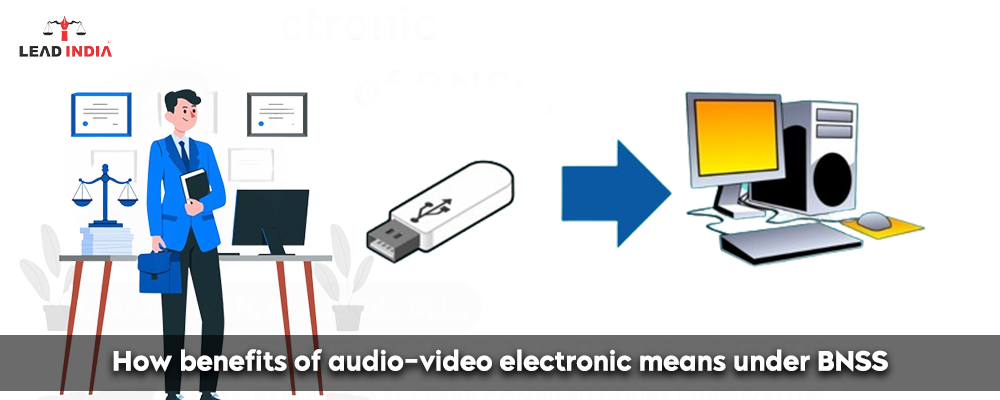The use of advanced technology can be seen in the newly enacted laws. Even the definition of evidence has been expanded to include electronic evidence. It now allows the appearance of witnesses, accused, victims, and experts through electronic means which means video calls. This will make the process of trial easier and it will also help in speeding up the trial process. This will also help in the reduction of adjournments.
Need A Legal Advice
The internet is not a lawyer and neither are you. Talk to a real lawyer about your legal issue

Benefits of audio-video electronic means for investigation and trial under BNSS
- Mandatory audio-video recording in search and seizure processes is essential for BNSS to prevent evidence manipulation. In BNSS, Section 105 covers audio and video recording during searches and seizures, including providing a list of confiscated objects and witness signatures. Transparency in search and seizure procedures can avoid evidence fabrication and ensure the participation of impartial witnesses.
- This section also provides that this audio video recording should be submitted to DM, SDM, and JM first Class on an immediate basis.
- The necessity for videography throughout forensic evidence collection under BNSS Section 176(3) encourages transparency, and accountability, and prevents manipulation.
- Audio and video recordings can improve evidence quality, but they must be protected from change, modification, or transposition through intentional or unintentional manipulation. Guidelines must be established to ensure the validity and correctness of electronic evidence.
- Section 176 permits audio or video recordings of statements made during police investigations. This provision includes disclosure statements of the accused before police, as well as statements of other witnesses (audio-video recording is previously permitted under Section 161 Cr. P.C and retained in Section 180 BNSS). This precaution precludes torture and coercion of the accused during interrogations in custody.
- The investigating officer may use audio-video technology tools to record witness statements for the investigation. The audio and video footage will be included in the case diary.
- The BNSS does not clarify about the equipment using which audio-video evidence can be recorded. This opens the door for recording it with the help of mobile phones as well. This eases the requirement of any equipment as nowadays, most people have mobile phones with them. It is easy to record any evidence without any delay. This also helps in the reduction of manipulation of evidence.
In Shafhi Mohammad v. State of Himachal Pradesh SLP (Crl.) Nos. 2302 of 2017, The Supreme Court in Shafhi Mohammad underlined not just the need for audio-video technology in assisting police with crime scene investigations, but also the importance of developing institutional and infrastructure capacity for its efficient and required application. During the proceedings in this case, infrastructural and institutional limitations in the effective use of audio-video technology in investigations were highlighted across states, including a lack of funding, equipment, systems for collection, secure storage, and transfer of electronic records, training, and forensic facilities.
Apart from all the benefits, there are certain disadvantages as well. There are various problems with electronic records’ susceptibility to alteration, modification, and transposition, whether through manual intervention or unintentional corruption of a digital document. These anxieties are heightened when a personal communication device is used for audio-video recording during an investigation. Furthermore, proving the integrity and correct chain of custody of an electronic record originating from a personal communication device that the police officer is constantly in possession of would be extremely challenging. It would also have detrimental effects on the privacy of the investigating officer.
Furthermore, there is a risk of electronic record contamination or corruption owing to a malfunctioning personal communication device. The misunderstanding concerning the applicability of the special process under section 63 BSB (equivalent to s.65B IEA) to show the authenticity and accuracy of the electronic record as an admission condition creates fresh concerns about the usage of personal communication devices by police officers.
Lead India provides free legal advice, internet information, and other legal services. We offer a forum where you may talk with a lawyer and ask legal questions. Lead India’s Lawyers may assist you with any legal matters. Lead India’s solicitors can help you with any legal concerns. Lead India also offers free online legal help in India. In addition to providing online legal aid, Lead India allows users to ask specialist inquiries for free.





 Talk to a Lawyer
Talk to a Lawyer